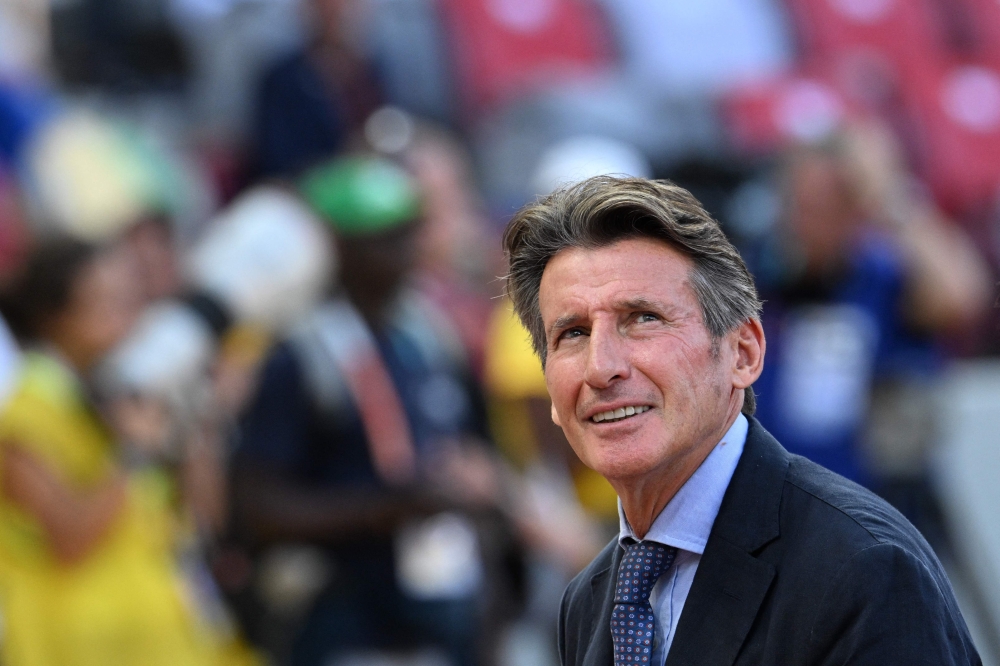PARIS, July 22 — Sebastian Coe has proven to be his own man throughout his life but he told AFP he has never worried about doing what he thinks is right “even if it means temporary or long-term unpopularity.”
The 67-year-old president of World Athletics, who has restored the governing body’s lustre since he was elected in 2015, said it was up to others to judge whether he has an independent streak or is stubbornly guided by his convictions.
“I don’t mean this in an arrogant way, I’ve never got sleepless nights over what people have thought about me or sometimes what I’ve stood up for,” Coe said in an interview ahead of the Paris Olympics.
“Actually, sometimes it’s not easy leaving the herd.”
The two-time 1500m Olympic champion has taken a hardline stance compared to many other federations by banning Russian and Belarusian athletes in response to the invasion of Ukraine.
He also took some flak after World Athletics took the revolutionary step this year of announcing that Olympic gold medallists will receive US$50,000 (RM234,185) payments.
Coe, though, time and again took decisions that were not to the taste of the political establishment, even if ironically, he served as a Conservative Party lawmaker from 1992-97.
“I went to the Moscow Olympics (in 1980) when the government that I went on to work for opposed that,” he said, referring to Margaret Thatcher urging a boycott of the Games due to the Soviet invasion of Afghanistan.
“There was an attempt to de-select me as a Conservative candidate when I chose not to go to South Africa on a rebel tour.
“On the basis that I had an Indian grandfather and my mother was half Indian, I just thought I’d actually rather face Margaret Thatcher’s ire than the ire of my mother on those sorts of occasions.”
He acknowledges part of this trait comes from his parents.
Peter, who “was born in one room in the East End (of London)” and went on to become a qualified engineer and his coach, and Tina, an actress who “did theatre for many years in London.”
“I’m reminded of that famous Woody Allen remark that he’s agnostic. In other words, he’s not quite sure which religion not to be brought up in,” Coe said.
“So there were a sort of a melange of mixes. My dad was old-school Socialist and my mum old-school Liberal.
“Politics was always discussed around the table. My parents marched in the anti-Vietnam War demonstrations in the 60s.
“So it was quite a bohemian upbringing, which some would say accounts for some of the things I do now.”

‘Enjoy solitude’
Peter’s bravery in World War II as a merchant seaman, aged just 19, escaping twice, once jumping from a German POW train and then from a camp in Spain, after his ship was sunk — he was one of only five survivors — also impacted Coe.
It is, though, a more recent war that has left its mark on him after he went to Ukraine for their athletics championships last month.
Coe said it was one of the two things at the “wrong end of the human condition” that will always “remain with me.”
“Leaving for Lviv that night from Kyiv, you couldn’t not be moved by seeing a hospital train come in, the second that day,” he said.
“There were a fleet of ambulances on the platform and another fleet sitting just the other side with families, and an intensive care unit where people are being operated on.
“Amputations are taking place as that train is coming from the front and families sitting, standing, waiting for sometimes desperate news.
“Yes, that was a sobering moment.”
The other event came in the wake of yet another huge success for him—guiding London from fourth in the running when he took over the bid campaign to winning in 2005 the right to host the 2012 Olympics.
The day after the vote in Singapore four suicide bombers killed 52 people and injured over 750 across London in what Coe terms “that unspeakable act of barbarity.”
“We probably spent more time in the next three weeks going to hospitals and memorial services than we did contemplating the delivery of the Games over seven years,” he recalled.
“I think that certainly coloured in a way the delivery of the Games.”
Coe may on occasion wander from the herd but he insists “contrary to popular opinion, I am quite a sociable animal”.
“I also enjoy solitude. It doesn’t spook me. I can spend time on my own,” he adds, suggesting this dates to his largely training on his own.
That has proved a potent mix, the solitude sparking a remarkable athletics career and off the track the “sociable animal” has worked its magic in engineering electoral success.
Nevertheless, despite such a stellar career he rates something closer to home as his greatest achievement.
“Helping bring four children up, not uniquely because their mother (Nicky) had more than a hand in this and on occasions probably an even greater hand, given all the things I have had to focus on,” he said.
“But navigating four kids through their teenage years and into, I hope, happy and adapted, healthy lives is, I think, the greatest achievement anybody can look to.
“So everything else sort of pales into insignificance compared to that, which is probably the most important thing I’ve ever done.” — AFP






















